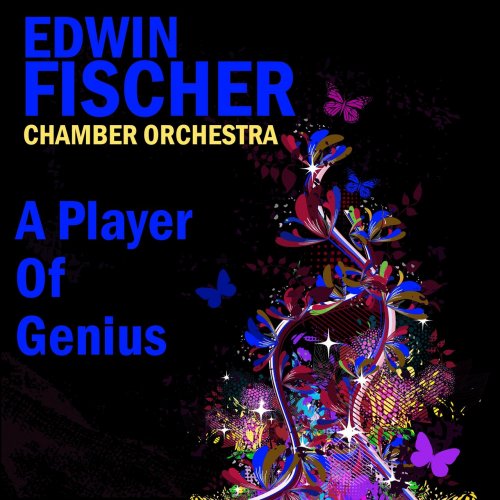
Edwin Fischer - A Player of Genius (2017)
BAND/ARTIST: Edwin Fischer
- Title: A Player of Genius
- Year Of Release: 2017
- Label: MVE
- Genre: Classical
- Quality: FLAC (tracks)
- Total Time: 01:16:56
- Total Size: 227 Mb
- WebSite: Album Preview
Tracklist:
01. Chromatic Fantasy and Fugue in D Minor, BWV 903: I. Fantasia
02. Chromatic Fantasy and Fugue in D Minor, BWV 903: II. Fuga
03. Prelude in A Minor, BWV 922 "Fantasia"
04. Fantasia and Fugue in A Minor, BWV 904: I. Fantasia
05. Fantasia and Fugue in A Minor, BWV 904: II. Fuga
06. Concerto No. 1 in D Minor, BWV 1052: I. Allegro
07. Concerto No. 1 in D Minor, BWV 1052: II. Adagio
08. Concerto No. 1 in D Minor, BWV 1052: III. Allegro
09. Concerto No. 4 in A Major, BWV 1055: I. Allegro
10. Concerto No. 4 in A Major, BWV 1055: II. Larghetto
11. Concerto No. 4 in A Major, BWV 1055: III. Allegro ma non tanto
12. Concerto No. 5 in F Minor, BWV 1056: I. Allegro
13. Concerto No. 5 in F Minor, BWV 1056: II. Largo
14. Concerto No. 5 in F Minor, BWV 1056: III. Presto
15. Ich ruf zu dir Herr Jesu Christ, BWV 639
Edwin Fischer, piano
Edwin Fischer Chamber Orchestra
01. Chromatic Fantasy and Fugue in D Minor, BWV 903: I. Fantasia
02. Chromatic Fantasy and Fugue in D Minor, BWV 903: II. Fuga
03. Prelude in A Minor, BWV 922 "Fantasia"
04. Fantasia and Fugue in A Minor, BWV 904: I. Fantasia
05. Fantasia and Fugue in A Minor, BWV 904: II. Fuga
06. Concerto No. 1 in D Minor, BWV 1052: I. Allegro
07. Concerto No. 1 in D Minor, BWV 1052: II. Adagio
08. Concerto No. 1 in D Minor, BWV 1052: III. Allegro
09. Concerto No. 4 in A Major, BWV 1055: I. Allegro
10. Concerto No. 4 in A Major, BWV 1055: II. Larghetto
11. Concerto No. 4 in A Major, BWV 1055: III. Allegro ma non tanto
12. Concerto No. 5 in F Minor, BWV 1056: I. Allegro
13. Concerto No. 5 in F Minor, BWV 1056: II. Largo
14. Concerto No. 5 in F Minor, BWV 1056: III. Presto
15. Ich ruf zu dir Herr Jesu Christ, BWV 639
Edwin Fischer, piano
Edwin Fischer Chamber Orchestra
Edwin Fischer was one of the great pianists of the twentieth century, and among the finest piano pedagogues of all time. At the Basle Conservatory his teacher was Hans Huber. He then studied in Berlin with Martin Krause.
He was taught at Berlin's Stern Conservatory, where he remained from 1905 until World War I, when he returned to Switzerland. He established himself as one of the finest pianists of his generation after the war. He became particularly associated with the major works of the great German masters, including Bach, Beethoven, and Brahms.
In 1926 he also became conductor of the Lübeck Musikverein and continued his conducting career in Munich from 1928 to 1932, as director of the Bachverein there. He transferred the base of his career to Berlin in 1932, when he became a member of the faculty of the Berlin Hochschule für Musik, succeeding Arthur Schnabel.
He also founded a chamber orchestra. His increasing interest in Classical and Baroque music led him to reinstate the authentic method of leading the ensemble from the keyboard while realizing the basso continuo.
While his concept of the music of that era remained essentially Romantic in concept, he sought to recover the classical purity of his favored composers, de-emphasizing excessive emotionalism and shifts in the basic pulse. As a result, he was typed as an intellectual pianist.
In 1942 he withdrew to Switzerland. After the war, he resumed appearing in chamber music and solo performance throughout Europe. His master classes in Lucerne were in high demand. He founded a foundation, the Edwin-Fischer-Stiftung, to support the beginning of promising young musicians' careers and to aid other needy musicians. As an academic and pedagogue, he published valuable books on musical interpretation and teaching.
He was taught at Berlin's Stern Conservatory, where he remained from 1905 until World War I, when he returned to Switzerland. He established himself as one of the finest pianists of his generation after the war. He became particularly associated with the major works of the great German masters, including Bach, Beethoven, and Brahms.
In 1926 he also became conductor of the Lübeck Musikverein and continued his conducting career in Munich from 1928 to 1932, as director of the Bachverein there. He transferred the base of his career to Berlin in 1932, when he became a member of the faculty of the Berlin Hochschule für Musik, succeeding Arthur Schnabel.
He also founded a chamber orchestra. His increasing interest in Classical and Baroque music led him to reinstate the authentic method of leading the ensemble from the keyboard while realizing the basso continuo.
While his concept of the music of that era remained essentially Romantic in concept, he sought to recover the classical purity of his favored composers, de-emphasizing excessive emotionalism and shifts in the basic pulse. As a result, he was typed as an intellectual pianist.
In 1942 he withdrew to Switzerland. After the war, he resumed appearing in chamber music and solo performance throughout Europe. His master classes in Lucerne were in high demand. He founded a foundation, the Edwin-Fischer-Stiftung, to support the beginning of promising young musicians' careers and to aid other needy musicians. As an academic and pedagogue, he published valuable books on musical interpretation and teaching.
Year 2017 | Classical | FLAC / APE
As a ISRA.CLOUD's PREMIUM member you will have the following benefits:
- Unlimited high speed downloads
- Download directly without waiting time
- Unlimited parallel downloads
- Support for download accelerators
- No advertising
- Resume broken downloads


